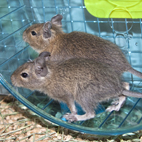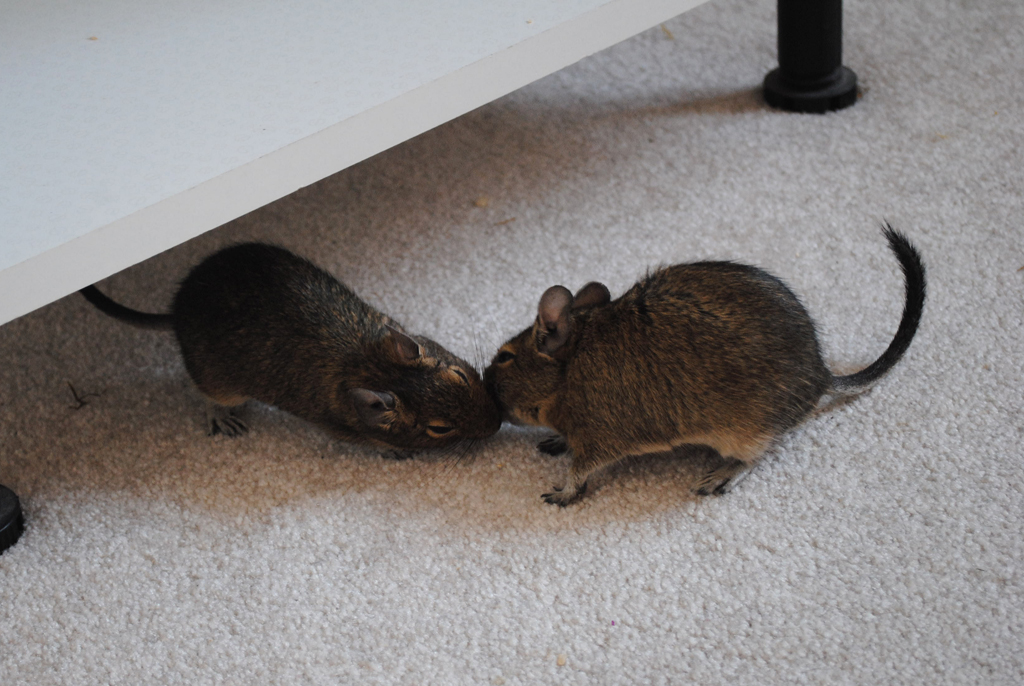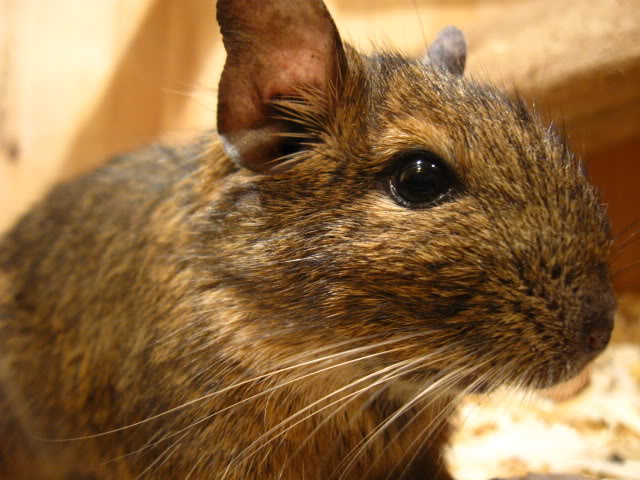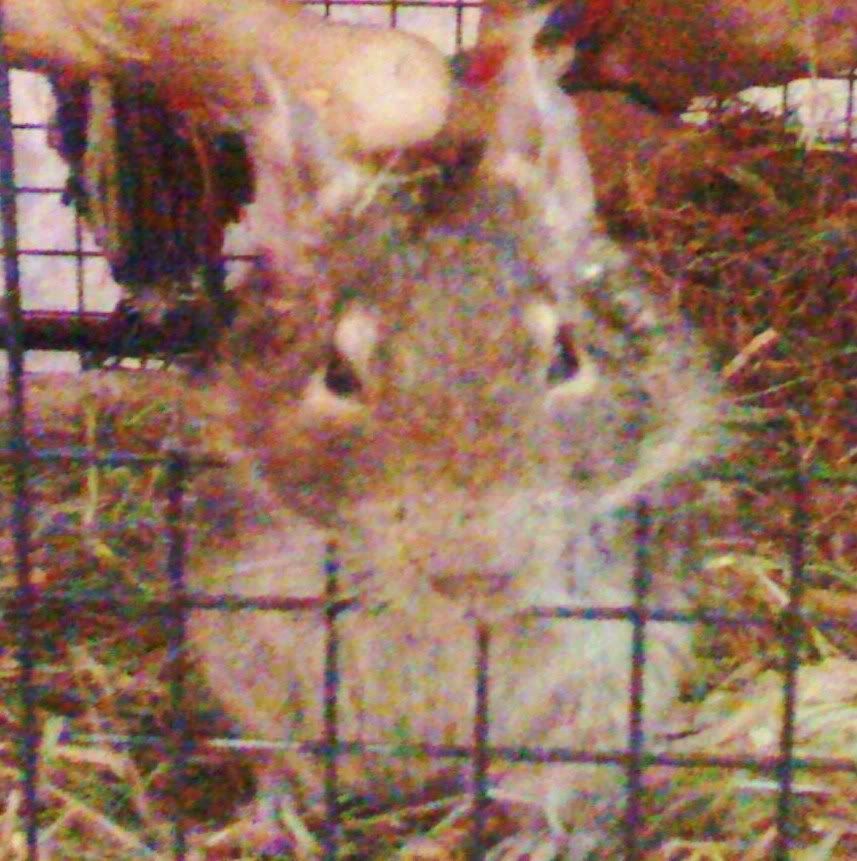|
|
Post by deguconvert on Apr 20, 2010 1:56:42 GMT
List of safe herbs/plants/flower/seeds for degus ! By NightWishRaven
« Thread Started Today at 2:42pm »
--------------------------------------------------------------------------------
After doing a lot of research and translating paragraphs and texts from German to English...I have accumulated a list of degu safe ingredients.
These ingredients are the basis of degu diet in many eastern European countries. Since degu food in the UK, USA and Canada is quite different and since very little information can be found on supplementing the diet of our degus...I though providing you with a list of safe herbs/plants/flowers and seeds might prove helpful.
I must admit, I did not know what many of these plants, herbs or flowers were...so I google them and in (...) specified what the ingredient is or what part is to be used.
Ex: Milk Thistle (Flower)
Some of you might be surprised to hear that many of these herbs and flowers have medicinal purposes. Several of these ingredients are actually used to create vitamins and natural remedies/anti-poisons and antidotes.
List of herbs/plants/flowers/seeds safe for degus :
Dandelion leaves
Dandelion flower
Grass
Meadow Grass
Echinacea (Flower)
Coltsfoot
Parsley
Daisy Flower
Rose Petals
Raspberry leaves
Stawberry leaves
Blackberry leaves
Birch leaves
Hazelnut leaves
Dill
Basil
Marigold flowers
Chamomile flowers
Dandelion roots
Pea flakes
Pumpkin seeds
Sage
Yarrow (Plant Flower)
Parley stems
Spitz and plantain (Plant/Flower)
Lemon Balm (Plant)
Oat Hay
Bean flakes
Grass seeds
Canary seeds
Mint
Jerusalem artichokes*(Flower)
Hibiscus (Flower)
Milk Thistle (Flower)
Stinging Nettle (Herb/Plant)
Red Clover
Honey Grass
Lady's Mantle (Plant/Flower)
Fence Vetch (Plant/Flower)
Crested dog's tail (Grass)
Perennial Ryegrass
Italian Ryegrass
Kentucky Bluegrass
Alsike Clover
Cumin
Cow Parsley
Fescue (Grass)
|
|
marmotta
Foraging Degu
  Tucah & Ricah
Tucah & Ricah
Posts: 57
|
Post by marmotta on Apr 20, 2010 7:27:44 GMT
I have fed my girls (yeah GIRLS, thanks for all your help sexing my new babies) fresh dandelion, grass and wild strawberry leaves from my own garden. They go nuts for them, and it even stems the start of World War III with a lot of squeaking and brawling, but hey, that's degus for you!  . My question is, how much of these foods can I feed them?  |
|
|
|
Post by deguconvert on Apr 20, 2010 14:49:08 GMT
You need to be moderate with the fresh greens . . . a small amount per day or less. The greens, although very good for the degu, can cause bloat if they are wet or if they get too much at a time. Bloat is to be avoided! However, you can take the time to let some of them dry, on a sunny ledge or something, and then mix some in with their daily food. The dried leaves and grasses will have a much lower chance of causing bloat. But, don't be fearful of offering the fresh greens, just make sure they are not wet or damp.
|
|
marmotta
Foraging Degu
  Tucah & Ricah
Tucah & Ricah
Posts: 57
|
Post by marmotta on Apr 20, 2010 17:46:27 GMT
Thank you Deguconvert! I will ensure any greens are totally dry and preferably a little dried up! ;D How would I recognise bloat?
|
|
|
|
Post by deguconvert on Apr 20, 2010 18:53:11 GMT
That is a great question, and I will have to look into that, as I don't know the answer myself. I'll get back to you . . . perhaps in the meantime there is another member who does know the answer and can reply?
|
|
|
|
Post by emz on Apr 20, 2010 20:10:47 GMT
I know that lethargy and a bigger stomach are usually the result of bloating on a degu. They may also show signs of pain if you pick them up and you should isolate a bloated degu from others. Read about it the other day when looking for an answer to someone else's question.  |
|
|
|
Post by deguconvert on Apr 21, 2010 0:46:35 GMT
Abdomen Distended stomach, bloating, lethargy. Degu appears fatter than normal, may show pain response when picked up. Gastrointestinal bloating
Pregnancy
Bloating- unsanitary living conditions, stress, feeding too much green vegetable matter. May also be caused by protozoal parasite infection56.
Pregnancy- contact with male degus.
Maintain good cage hygiene, avoid unnecessary stress, feed fresh greens in small amounts twice a week. Isolate infected degus. Avoid handling bloated degus, if lethargic seek veterinary attention immediately. GOOD to POOR
Copied the above over from Degutopia. Just like Emz said . . . except for the contact with males part, LOL!
|
|
marmotta
Foraging Degu
  Tucah & Ricah
Tucah & Ricah
Posts: 57
|
Post by marmotta on Apr 21, 2010 7:48:00 GMT
Oh, I better go easy on the fresh greens then! That is rather weird though - don't degus eat fresh greens in the wild???  |
|
|
|
Post by emz on Apr 21, 2010 8:00:54 GMT
A wild degu eats a diet of grasses, seeds and roots - so no fresh greens.
|
|
|
|
Post by NightwishRaven999 on Apr 21, 2010 14:34:48 GMT
emz is correct, wild degus mostly consume grass, seeds and roots.
They also eat herbs, small flowers and tree bark.
I remember reading a few places that said degus are native pests in Chile.
They get together in large numbers and raid the local farms and crops...its like organized crime ! So they do have a certain level of contact with veggies that are grown there.
I also remember reading that they will occasionally snack on wild berries and other small fruits they find.
So while their diet does not consist mainly of vegetables/fresh greens, we must remember that our degus consume degu pellets (which contain hay and small amounts of herbs).
Depending on the country we are residing in, it can be very hard to find ingredients to simulate their natural diet.
I use vegetables like cucumber, zucchini, lettuce, celeri, and small carrot chips to supplement my degus' diet. It provides them with more vitamins and also gives them an opportunity to eat fresh foods as opposed to eating dried food pellets most of the week.
So while vegetables should not consist of their main diet, I believe they are important.
We must also remember that while natural diet is important, wild degus are not at all healthy.
They still suffer from illness, diabetes and liver disease. The amount of seeds they eat can quickly augment their risk of being atteined by liver disease.
A group of degus that has frequent encounters with berry patches or other small wild fruits, can become diabetic. These problems not only affect captive degus, they are also prone to these conditions in the wild.
Its also noted that wild degus rarely make it past their 1 year.
This not only has to do with predators but we can also assume diet and bad health has a part to play in this.
Anyways, this is another example of me straying from the subject...hehe
|
|
marmotta
Foraging Degu
  Tucah & Ricah
Tucah & Ricah
Posts: 57
|
Post by marmotta on Apr 21, 2010 16:48:45 GMT
Sorry, I think I wasn't being specific enough! By greens, I am referring to grass in the main, and the occasional dandelion and strawberry leaves.  |
|
|
|
Post by NightwishRaven999 on Apr 21, 2010 17:09:33 GMT
@ marmotta
Emz and I thought you were reffering to vegetables.
Sorry for misunderstanding. In that case, follow deguconvert's advice.
Dont refrain from giving them grass, herbs or flowers...thats not what deguconvert is saying.
Just make sure that if you rinse them, you dry them out afterwards.
Something I like to do when I collect dandelion or red clover plants is to rince them very well under lukewarm water and then dry them in the salad spinner. I give my degus a fresh portion and store the rest until its crisp and dry. The degus like them both ways : )
|
|
marmotta
Foraging Degu
  Tucah & Ricah
Tucah & Ricah
Posts: 57
|
Post by marmotta on Apr 21, 2010 17:20:50 GMT
NightwishRaven999Thank you for your advice. It's my fault for calling grass and herbs "greens"!  I was wondering about drying my own grass anyway. That has got to be well tasty and healthy for any Goo!!! Have a nice evening with your critters! 
|
|
|
|
Post by charliex on Apr 30, 2010 15:35:36 GMT
wow thats a huge list thanks for posting this ive booked marked it and i plan to print it xx
|
|
|
|
Post by NightwishRaven999 on Jun 8, 2010 7:56:51 GMT
----------------------------------------------------------------------------------- I would like to add Millet seeds to this list.  You can often find Spray Millet at the pet store. Its usually sold for birds. When I went to get a few supplies for the pets I came accross a bag of Spray Millet. I remembered seeing photos of degus eating this, but I couldnt remember reading about it. So I decided to research this specifically and found that it is a commonly used treat for degus.   |
|
|
|
Post by deguconvert on Jun 9, 2010 5:53:06 GMT
Yeah, I always forget this one, even though I regularly buy it for our boys. They LOVE it. Like sunflower seeds, it is fairly high in fat, so needs to be given in moderation.
|
|
|
|
Post by roobarb on Jun 11, 2010 18:31:47 GMT
my degus don't really like the ordinary food so i am trying them on strawberry leaves and porridge oats, so far so good  |
|
|
|
Post by smux on Jun 12, 2010 1:44:12 GMT
Strawberry leaves are probably high in sugar (higher than most leaves), being a fruit and especially being one known for its sweetness, so keep those to a minimum. And I've mentioned this elsewhere in a post you made about their pickiness, but don't give in to their whims about food...balanced diets are important to degu health. A hungry degu will eat food they don't like rather than starve, feel free to offer them the odd porridge oats treat but don't let them get away with eating what they want. Picky degus get switched over to nuggets (although I personally give them nuggets with a little "mix" thrown in for variety...they actually like the nuggets for some reason (it's what they were fed as babies, that's probably why) :-)
|
|
|
|
Post by angel45 on Aug 25, 2010 18:48:41 GMT
hi there
my self and my hubby (slaine ) have just become degu owners adding to the mad house i breed rabbits and i usie barley rings for them anyone know if you can give degus these as they would be great for chewing ?
|
|
|
|
Post by kaininaste on Oct 13, 2010 12:01:13 GMT
I give my degus bran flakes for training purposes (sometimes herbs too).
They have about a bran flake each a day as I break them into little pieces to train them. I read that bran flakes etc can be bad for them because of the starch - is there anything which make good training aids and don't have to be kept to such a minimum? Or would it be easier to use, for example, bran flakes and porridge oats so they don't have too much of either?
|
|




 . My question is, how much of these foods can I feed them?
. My question is, how much of these foods can I feed them? 














